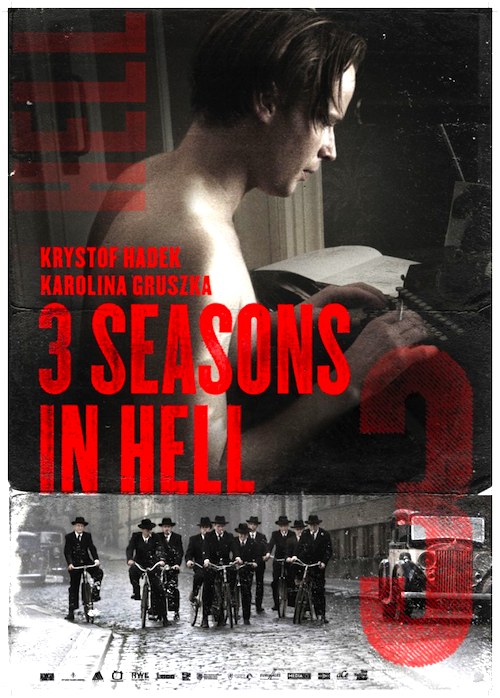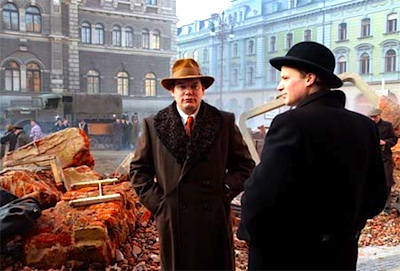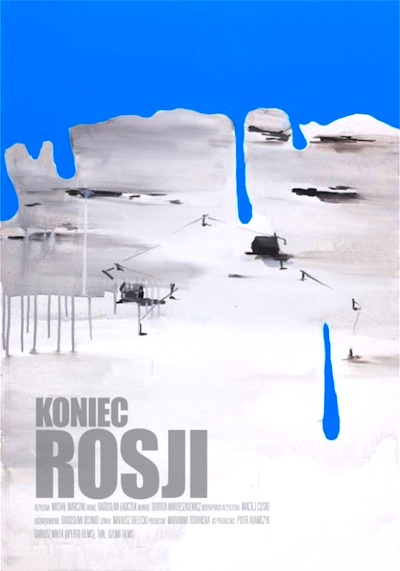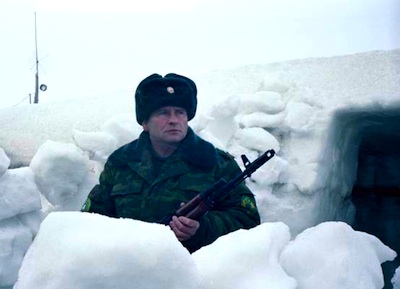 By Joe Bendel. Ivan Heinz is the anti-Zhivago, a terrible poet who naively welcomes the Communist takeover of post-war Czechoslovakia. He soon learns the harsh truth about the Marxist regime. His poetry also dramatically improves over the course of three tumultuous years in Tomás Masín’s 3 Seasons in Hell (trailer here), which screens tonight in D.C. as part of the Avalon Theatre’s Lions of Czech Cinema film series.
By Joe Bendel. Ivan Heinz is the anti-Zhivago, a terrible poet who naively welcomes the Communist takeover of post-war Czechoslovakia. He soon learns the harsh truth about the Marxist regime. His poetry also dramatically improves over the course of three tumultuous years in Tomás Masín’s 3 Seasons in Hell (trailer here), which screens tonight in D.C. as part of the Avalon Theatre’s Lions of Czech Cinema film series.
Young Heinz has imbibed way too much dada. He harbors idealistic notions of the artist as an absurdist troublemaker that wins him few friends. His avowed Communism also strains his relationship with his painfully middle class father. Heinz is determined to suffer for his art, like his hero Rimbaud. Unfortunately, he will get his chance following the Communist coup.
At first, Heinz is surprised the masses are not celebrating the dawn of socialism on the streets of Prague. Of course, he is even more shocked to learn that the new regime has little use for a parasitic poet of bourgeoisie lineage with a record of anti-social behavior. His notoriously hedonistic lover Jana has scarcely any better standing. Eventually they come to the realization that this worker’s paradise is no place for their unborn child to live. Naturally though, his plans for emigration involve a dangerously dodgy criminal scheme.
Loosely based on the memoirs of Czech writer Egon Bondy, 3 Seasons hardly idealizes Heinz. Frankly, he is rather a petulant pill much of the time, but that never excuses any of the degradations he suffers and witnesses. Likewise, Jana would be quite a problematic figure as well, but together they seem the perfect pair, who deserve (and want) each other. Yet, should viewers ever doubt the film’s sympathies, the exquisite dignity and integrity of Heinz, Sr. serves a pointed corrective to the cruel madness unfolding around him.

Indeed, Martin Huba (recognizable to some from Jan Hrebejk’s excellent Kawasaki’s Rose) supplies the film’s heart and soul as Heinz père, achingly sincere, while keeping his character solidly grounded. In contrast, Krystof Hádek gets to act out all over the place, but he still finds something deeply human in the junior Heinz. In fact, we watch him mature rather dramatically and credibly, under the starkest of circumstances.
Like the recently released Protektor, 3 Seasons is truly an artfully rendered film, filled with striking images and a dynamic visual sensibility, with great credit due to cinematographer Karl Oskarsson. The unexpectedly jaunty score composed by Filip Jelínek is also oddly effective, somehow never letting the mood get too maudlin, regardless of the abject desperation.
In truth, Masín takes a surprising number of risks throughout the film, but they pay off quite handsomely altogether, resulting in a boldly distinctive historical morality play. Distributed internationally by Yellow Affair, 3 Seasons is highly recommended for Beltway denizens tonight (8/10) at the Avalon and hopefully still has many more screening ahead of it around the country.
˜
 If the neo-Soviet Russian government is willing to allow a Polish filmmaker access to one of its distant sub-arctic posts, it is a safe bet few military secrets could be gleaned from the soldiers stationed there. In fact, the frozen border guards do not even have spoons in Michal Marczak’s deceptively un-documentary-like At the Edge of Russia (trailer here), which screens tonight as part of Rooftop Film’s 2011 summer season—and admission is free.
If the neo-Soviet Russian government is willing to allow a Polish filmmaker access to one of its distant sub-arctic posts, it is a safe bet few military secrets could be gleaned from the soldiers stationed there. In fact, the frozen border guards do not even have spoons in Michal Marczak’s deceptively un-documentary-like At the Edge of Russia (trailer here), which screens tonight as part of Rooftop Film’s 2011 summer season—and admission is free.
Recruited out of college, Alexei Zarubin is in for an education. He had anticipated seeing some action, but finds himself assigned to Ice Station Zilch instead. However, snow-blindness and boredom are very real and pressing dangers here. Initially, the old-timers haze him a bit, but nothing too serious. Clearly, in such cramped and isolated quarters, everyone must get along reasonably well.
Not a complete idiot, Zarubin steadily wins the confidence of the weathered veterans. Time passes without any sightings of invading armies on the horizon. In truth, once Zarubin is instructed how to wrap his feet to prevent frostbite, he is probably in the safest spot of all Mother Russia. Yet, in proper Orwellian fashion, Putin’s grinning mug looks down upon them throughout the ramshackle outpost.
Evidently there are twelve such military bases still in operation along Russia’s northern border, all dating back to the 1950’s. Even during the Cold War, their efficacy was highly questionable, especially during the 1970’s when Canadian PM and Castro BFF Pierre Trudeau was arguably more anti-American than the Soviets. Nevertheless, Zaburin and his comrades walk the line, like characters in a frosty Beckett play.

Zaburin’s senior officers are so cinematic, in a craggy character actor sort of way, it is difficult to believe they are not actors. While Marczak’s approach is strictly observational, he reportedly did a bit of re-staging and the like. Still, cinematographer Radoslaw Ladczuk achieves a more polished look than one sees in the majority of the grungy narrative features that are quickly hailed and then forgotten on the festival circuit. Viewers should be warned, there is a whole lot of snow shoveling in this film. Yet, as the grizzled Valery Vasiliev’s rotation fast approaches, his mounting anxieties regarding home and hearth provide the film a sense of narrative structure.
Seventy-two minutes is probably the optimal length of time to spend on Russia’s arctic border. After seeing the state of readiness of the border guards (which is far higher than necessary) and the resources at their disposal (which would have been considered crude five decades ago) it is hard to say whether Edge should leave viewers more or less concerned about the imperialistic ambitions of Putin’s Russia. Either way, it opens a fascinating window into one of the most remote yet well guarded corners of the world. Recommended for Russophiles, particularly at no cost courtesy of Rooftop Films, Edge screens tonight (8/10) at the Socrates Sculpture Garden in Long Island City.
Posted on August 10th, 2011 at 11:10am.
Please let us know when/if these films are available in DVD or netflix download. And keep the anti-Communist movie theme going here at Libertas- it’s wonderfully subversive and deliciously counter cultural.
You bet K – we will let you know! I’m still waiting for “Disco and Atomic War” to hit DVD. It’s probably one of the best documentaries I’ve ever seen about the Cold War and how American pop culture undermined the Soviet regime. It’s hilarious, smart, and crisply edited. More and more of these anti-Communist films are being made, and we’ll keep promoting them.